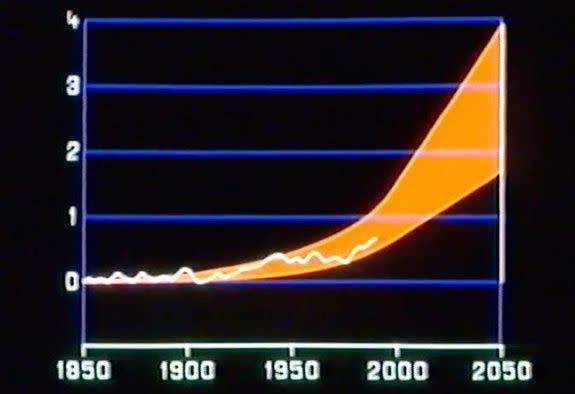In an ironic twist, a 1991 Shell ad contains a warning about climate change

The U.S. president might doubt the reality of human-driven climate change, but you know who doesn't? Major oil companies. In fact, they've known the reality of the problem for decades.
Take Royal Dutch Shell, for instance.
In 1991, the Anglo-Dutch oil giant produced a film, called "Climate of Concern," that warns of potentially catastrophic risks from burning the very oil and gas that companies like Shell produce.
SEE ALSO: Trump gives second life to Keystone XL, Dakota Access oil pipelines
Its narrator speaks of a "new sense of urgency" driven by the "realization that our energy-consuming way of life may be causing climatic changes, with adverse consequences for us all" — like famine, flooding, waves of climate refugees and extreme weather.
Many of these consequences have now become apparent, and are predicted to worsen in the coming decades.
The Correspondent, a Dutch online journalism platform, recently unearthed the video and shared it with the Guardian newspaper. Both outlets published stories on Tuesday, sparking the hashtag #ShellKnew.
The phrase invokes #ExxonKnew, the slogan referring to recent revelations that ExxonMobil rigorously studied climate science in the 1970s and '80s and then worked to protect its bottom line by lobbying groups to sow confusion about the ties between burning fossil fuels and global warming.
Exxon is now under investigation by the U.S. Securities and Exchange Commission and state attorneys general for allegedly misleading investors about the risks climate change and regulations pose to its bottom line. Rex Tillerson, the company's CEO until Dec. 31, is now the U.S. secretary of state.
Compared to Exxon, Shell has been more forthcoming about the reality of human-caused climate change.
"We believe that climate change is real and we believe that action will be needed," Ben van Beurden, Shell's CEO, told reporters on Feb. 2 during an annual earnings presentation.
A Shell spokeswoman confirmed to Mashable that it produced the 26-year-old educational film, and said the company never tried to conceal the video from the public.
"Our position on climate change is well known; recognizing the climate challenge and the role energy has in enabling a decent quality of life," she said in an email.

Image: climate of concern/shell
For environmental groups and climate advocates, Shell's film is yet another example of an oil company knowing that its products damage the climate — and continuing to drill, frack, mine and otherwise extract fossil fuels anyway.
Shell is a major player in the Canadian tar sands region and has spent billions of dollars exploring the Arctic Ocean for potential oil and gas drilling. However, its ventures in both regions have recently suffered setbacks due to low oil prices and high exploration costs.
"Having known in very straightforward terms the trouble we were in, they not only kept at their core business undeterred, but indeed proposed opening up the Arctic to oil drilling as recently as two years ago," Bill McKibben, a leading environmental activist and journalist, said in an email.
"Think about that for a minute," he added. "If there are business schools a hundred years from now, Exxon and Shell will be the case studies in cowardice."

Image: DAVID ryder/Getty Images
Yet Shell is also making important investments in clean energy technologies, including wind power and sugarcane ethanol. The company, which is Europe's biggest oil producer, last year created a New Energies division to invest at least $1.7 billion in renewable and low-carbon energy.
Shell has also advocated for putting a price on carbon emissions, a policy tool that would make it more expensive to emit greenhouse gases and provide more funding for clean energy investments. Shell's spokeswoman said the company generally applies its own internal carbon price, of about $40 per metric ton, to guide decisions on future investments.
"We believe that we are in the middle of an energy transition that is unstoppable and we want to be in the vanguard of that," van Beurden said.
